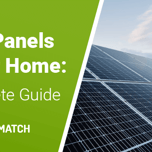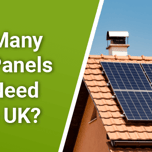Answer these simple questions and we will find you the BEST prices
Which type of solar quotes do you need?
It only takes 30 seconds
100% free with no obligation

Get up to 4 quotes by filling in only 1 quick form

Slash your energy bills by installing solar panels

For the average 2-3 bedroom house
- GreenMatch
- Solar Energy
- Solar Panels
- Commercial Solar Panels
Commercial Solar Panels in the UK: Guide (April 2025)

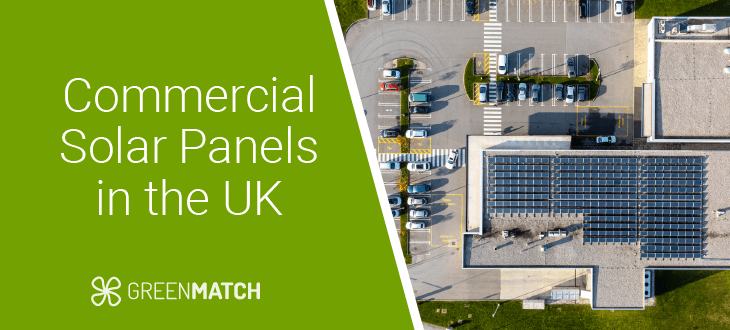
- Commercial solar panels can cost approximately between £16,000 - £60,000 (20kW to 50kW systems) for small to medium-sized businesses.
- On average, commercial solar panels can break even in 4 or 5 years due to their high solar absorption capacities and the possibility of selling electricity back into the grid through schemes such as the Smart Export Guarantee (SEG).
- Reduced costs, energy efficiency, and energy independence are among the main benefits of solar panels for businesses.
Commercial solar panels can be beneficial regardless of whether your company is large or small. Most businesses are active during the day, which means they are the perfect candidates for utilising solar panels and enjoying the cost savings that come with them. Let’s see if commercial solar panels are right for you.
Interested in commercial solar panels? We can help you get the best deal! Don’t waste hours contacting installers on your own. Simply fill out our 30-second form, and we’ll do the rest. We’ll connect you with up to 4 trusted solar panel installers near you for free, no-obligation quotes. Click below to get started.
- Quotes from local engineers
- Payment by finance available
- Save up to £1,110 per year
It only takes 30 seconds



- Commercial Solar Panels in the UK: Guide (April 2025)
- Why use solar panels for businesses?
- How much do commercial solar panels cost?
- Grants for solar panels on commercial buildings
- Savings and break-even point of commercial solar installations
- What are the benefits of commercial solar PV?
- What are the disadvantages of commercial solar installation?
- Do you need planning permission to install commercial solar panels?
- Are commercial solar panels worth it?
- FAQ
Why use solar panels for businesses?
Commercial solar panel installation can bring many benefits:
- Over the 25-year lifetime of solar panels, savings can equate to thousands of pounds. A 20kW system can potentially save businesses over £3,000 annually on their electricity bills.
- Solar panels allow for energy independence and some level of insulation from fluctuating electricity prices. They can also be handy as a backup when there is a power outage, especially if you have a solar battery.
- If you operate industrial solar panels, you can sell excess energy to utility companies for a profit through arrangements like Power Purchase Agreements (PPAs) or the Capacity Market.
- By switching to commercial solar panels for your business, you will also lower your carbon footprint along with the operating costs.
- Solar energy is also renewable and carbon neutral, which could improve your reputation. Switching would indicate your business’s commitment to green and sustainable practices and energy conservation.
How much do commercial solar panels cost?
On average, commercial solar panels cost between £16,000 - £60,000 for small to medium-sized businesses. Several factors influence the cost of solar panels, such as roof size, the amount of energy produced and the number used.
Most small to medium-sized businesses use 30,000 - 50,000kWh of electricity each year. Depending on where your business is located in the UK, your system size, and the cost per kilowatt (kW), this can vary.
Begin by evaluating the cost to determine if solar panels are a feasible option for your business. Take a closer look at your utility bill and see how much energy you use each month, along with how much the utility company charges you per kW.
A general breakdown of the cost of commercial solar panels can be seen below, excluding VAT.
| System size | Business size | Average cost + installation | Break-even time |
|---|---|---|---|
| 10kW | Small businesses with basic needs include small shops (e.g., flower shops, hair salons), small offices, and single-person hospitality ventures like coffee bars. | £13,000 - £15,000 | 5 - 6 years |
| 20kW | Medium-sized businesses with specialised equipment include speciality stores, offices, and service businesses. | £16,000 - £30,000 | 4 - 5 years |
| 50kW | Small-scale commercial businesses needing refrigeration, lighting, and tools, including supermarkets, garages, and cafes. | £33,000 - £60,000 | 3 - 6 years |
| 60kW | Medium-sized commercial establishments with significant equipment needs, including supermarkets, gyms, and fast-food restaurants. | £39,000 - £75,000 | 3 - 5 years |
| 80kW | Large commercial and small industrial operations, including supermarkets, manufacturing plants, and small hotels. | £50,000 - £100,000 | 3 - 6 years |
| 100kW | Large-scale facilities, including large supermarkets, big restaurants, event venues, offices, and warehouses with heavy equipment. | £60,000 - £120,000 | 2 - 5 years |
For context, a 15kW solar panel system is typically sufficient to meet the energy needs of a small business in the UK, which generally consumes between 39kWh and 60kWh per day. According to energy providers, the average daily energy consumption for small businesses in the UK ranges from 41kWh to 68kWh.
Based on these figures, the average small business would spend approximately £15,000 to £16,000 on a 15kW solar panel system.
If you operate a small business, you could get a price estimate by comparing the installation cost of solar panels and solar battery prices in the UK.
In addition, you may be eligible for tax relief if you have commercial solar panels installed. However, this is not possible for businesses that rely on solar energy for revenue generation, such as solar farms.
Installation maintenance and insurance costs
When installing a solar panel system for your business, the main expenses are the panels and inverters. Installation costs may increase for larger systems, especially if additional time or workers are required. A rough estimate for commercial installation is 0.2p per Watt fitted, meaning a 10kW system could cost approximately £2,000 (excl. VAT). Larger systems requiring more workers will thus incur higher installation costs.
Annual solar panel maintenance costs typically range between £100 and £200, or you can do it yourself for free. Major component replacements, such as string inverters (£1,000–£2,000 every 10 years) or optional battery storage (£5,000–£15,000), are more significant expenses.
Insurance may add £10–£20 per month to your home policy or a one-time specialised solar panel insurance fee of £400–£1,600, depending on the system size and coverage. Integrated monitoring systems can reduce maintenance frequency by enabling easy issue detection.
Grants for solar panels on commercial buildings
While it’s commonplace for homes, can businesses also benefit from solar panel grants and get free solar panels? Currently, the UK does not offer government grants for solar panels on commercial buildings. On the other hand, the UK government has also applied 0% VAT on goods like solar panels and sustainable technologies, which can save on purchase costs.
| Grant | Running period | Eligibility | Potential savings |
|---|---|---|---|
| The Smart Export Guarantee (SEG) | Effective from January 2020 onwards | Requires a smart meter to measure exported power | The earning rate in 2025 is roughly 5p to 15p per kWh, depending on your provider. |
| Salix Funding | Effective from 2004 onwards | Interest-free loans to public sector bodies in the UK for energy efficiency and decarbonisation projects | Interest-free capital for energy-efficient technologies |
| Industrial Energy Transformation Fund (IETF) | Phase 3: 2024–2028 | For large energy-intensive industrial businesses, eligibility varies per phase | Funding supports energy efficiency and decarbonisation projects for industrial processes, including the adoption of solar panels. |
| Local Authority Grants | Varies | It depends on the provider's criteria | Some organisations offer support for solar panel installation to businesses |
Available grants are constantly updated, so staying informed is best. For this reason, we can find up to 4 free quotes from solar experts in your area who can assist you along the way. Avoid the hassle of spending days on research and comparisons on your own. Fill in our 30-second form, and we’ll do the rest.
- Quotes from local engineers
- Payment by finance available
- Save up to £1,110 per year
It only takes 30 seconds



Savings and break-even point of commercial solar installations
Commercial solar panels for small to medium-sized businesses in the UK typically cost between £16,000 and £60,000 for 20kW to 50kW systems.
While the upfront cost may seem high, businesses can break even in 4 to 5 years due to these systems' high solar absorption capacities and opportunities to sell excess electricity back to the grid through schemes like the Smart Export Guarantee (SEG).
Below is a breakdown of the potential solar panel savings by system size, which can help you understand the lifetime savings you can expect by opting for commercial solar panels for your business.
| System size | Estimated annual savings |
|---|---|
| 20kW | £3,260 |
| 30kW | £4,890 |
| 40kW | £6,520 |
| 50kW | £8,150 |
Based on average electricity consumption (kWh) according to Ofgem and estimated electricity generated per year (kWh). These costs are estimates. Get a local installer QUOTE now!
What are the benefits of commercial solar PV?
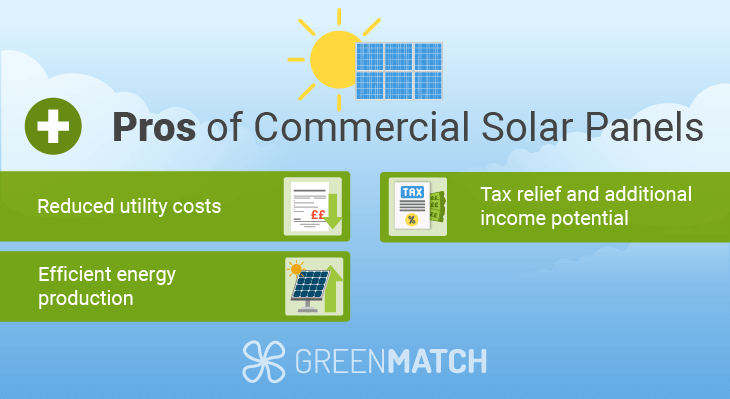
There are many advantages of solar energy, such as cost, efficiency, and income potential. Below, we break down the 3 key advantages of using solar panels for your business.
Energy from commercial solar PV panels will cost a fraction of what you were paying to receive from a utility company. While saving only a few pence per kWh sounds small, it adds up quickly.
For example, commercial solar systems can generate average annual savings between £3,260 to £8,150 (based on systems ranging from 20kW to 50kW). Additionally, the average solar panel maintenance cost in the UK is relatively low. Therefore, you can enjoy reduced overall expenses for your electricity consumption.
Commercial solar panels typically operate at efficiency levels of 15% to 20%. However, achieving 100% solar panel efficiency is impossible due to physical limitations.
Despite this limitation, there are ways to enhance day-to-day operations, for example, proper panel orientation, ideally facing southwards, regular cleaning, avoiding shading, and ensuring high-quality inverters.
The SEG scheme in the UK provides business owners with an additional revenue stream by allowing them to sell surplus electricity back to the grid. Top tariffs like Octopus Energy’s Intelligent Octopus Flux offer up to 30.31p/kWh for compatible systems.
Combined with the 0% VAT policy on solar panel purchases and tax reliefs, investing in a photovoltaic system is a cost-effective way to reduce energy bills and earn passive income, making it both financially and environmentally rewarding.
If these advantages interest you, you should consider contacting an installer to see what type of solar technologies your business or home can leverage. Finding a good installer can take days of research, which is why we offer a better way.
Our service can quickly and easily help you obtain up to 4 free, non-binding quotes from reliable companies in your area. They can assess your situation and advise you on the best prices. Click the button below to get started.
- Quotes from local engineers
- Payment by finance available
- Save up to £1,110 per year
It only takes 30 seconds



What are the disadvantages of commercial solar installation?
As with most things, commercial solar installation has its disadvantages that are worth keeping in mind.

One of the most prominent disadvantages is the high initial investment cost. When you buy commercial solar panels, you know you’ll see a high return on investment (ROI) eventually, but that can take years.
All solar panels are weather-dependent, as the photovoltaic effect converts energy from the sun. Solar panel efficiency will decrease when there is poor weather with low sunlight, snowfall or extreme heat. However, solar panels will still produce energy with indirect sunlight or in the winter months, regardless.
Do you need planning permission to install commercial solar panels?
In some situations, you may need to obtain planning permission for solar panels before installing commercial solar panels. In many cases, the contracting company completing the installation may be willing to sort out these permissions on your behalf.
Always ask before signing any contracts so you know what to expect. Some regions require planning permission to install solar panels on flat roofs. You will need permission if your building or property site is designated as historical or part of a world heritage site.
If you reside in a conservation area and require additional assistance regarding solar panels, we have prepared a comprehensive guide specifically tailored for solar panels in conservation areas.
If you are in doubt, we highly recommend consulting a professional solar panel installer. There are many qualified installation companies across the UK, but finding the right one can take days of research, calling, or emailing. However, by filling in our 30-second form, you can be connected with up to 4 different vetted installers in no time.
Each installer will be able to help you with several things:
- Identifying if you need planning permission
- Providing you with a competitive quote tailored to your energy demands
- Installing your new solar panel system.
Are commercial solar panels worth it?
In a nutshell, we can easily confirm that commercial solar panels are worth it for business owners in the UK. This can seem surprising since their upfront costs may appear substantial, ranging from £16,000 to £60,000. However, with annual savings of up to £8,150 and low maintenance costs, they quickly become cost-effective.
Solar panels also provide energy independence and insulation from fluctuating electricity prices, and when paired with a battery, they can serve as a backup during power outages.
In addition, financial incentives like the SEG scheme and the 0% VAT policy enhance their appeal, allowing businesses to earn extra income by selling excess energy. Industrial users can further benefit from Power Purchase Agreements or participation in the Capacity Market.
While the variety of manufacturers and systems may seem overwhelming, the long-term financial and environmental benefits make solar panels a valuable investment.
There are two ways to compare solar experts in your area. You can spend hours of your spare time searching for them alone, or you can simply fill out our 30-second form and let us do the hard work. We’ll connect you with up to 4 trusted installers in your area. Click below to get started!
- Quotes from local engineers
- Payment by finance available
- Save up to £1,110 per year
It only takes 30 seconds



FAQ
In some situations, you may need to obtain planning permission before installing commercial solar panels, especially if you have a flat roof. Regardless, it can be worth it due to the many benefits solar panels can bring.
Yes. Solar panels reduce costs, improve efficiency, and carry many other benefits for businesses.
The best type of solar panel for commercial use is a polycrystalline panel due to its high efficiency. Typically, a 20kW system can be sufficient for the average small business but this can vary based on numerous factors.

Rawal Ahmed is a writer at GreenMatch with an interest in sustainability and a background in tech journalism and digital marketing.

We strive to connect our customers with the right product and supplier. Would you like to be part of GreenMatch?

- Commercial Solar Panels in the UK: Guide (April 2025)
- Why use solar panels for businesses?
- How much do commercial solar panels cost?
- Grants for solar panels on commercial buildings
- Savings and break-even point of commercial solar installations
- What are the benefits of commercial solar PV?
- What are the disadvantages of commercial solar installation?
- Do you need planning permission to install commercial solar panels?
- Are commercial solar panels worth it?
- FAQ
- Quotes from local engineers
- Payment by finance available
- Save up to £1,110 per year
It only takes 30 seconds




